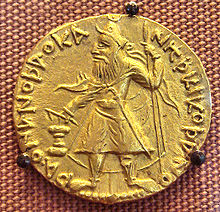
Back كانيشكا Arabic كانيشكا ARZ I Kanişka Azerbaijani کانیشکا AZB কণিষ্ক Bengali/Bangla Kanixka I Catalan Kaniška Czech Kanischka I. German Κανίσκα Α΄ Greek Kaniŝka Esperanto
| Kaniṣka, Kanishka | |
|---|---|
| Kushan emperor | |
 Gold coin of Kanishka. Greco-Bactrian legend: ϷΑΟΝΑΝΟϷΑΟ ΚΑΝΗϷΚΙ ΚΟϷΑΝΟ Shaonanoshao Kanishki Koshano "King of Kings, Kanishka the Kushan". British Museum. | |
| Reign | 127–150 CE |
| Predecessor | Vima Kadphises |
| Successor | Huvishka |
| Born | Possibly Khotan, present-day Xinjiang, China (per Chinese chronicles)[1][2][3] or Kashmir[3] |
| Dynasty | Kushan |
| Kushan emperors 30 CE–350 CE | ||||||||||||||||||||||||||||||
|---|---|---|---|---|---|---|---|---|---|---|---|---|---|---|---|---|---|---|---|---|---|---|---|---|---|---|---|---|---|---|
|
||||||||||||||||||||||||||||||
Kanishka I,[a] also known as Kanishka the Great,[5] was an emperor of the Kushan dynasty, under whose reign (c. 127–150 CE) the empire reached its zenith.[6] He is famous for his military, political, and spiritual achievements. A descendant of Kujula Kadphises, founder of the Kushan empire, Kanishka came to rule an empire extending from Central Asia and Gandhara to Pataliputra on the Gangetic plain. The main capital of his empire was located at Puruṣapura (Peshawar) in Gandhara, with another major capital at Mathura. Coins of Kanishka were found in Tripuri (present-day Jabalpur).[7]
Although he never converted to the religion, his conquests and patronage of Buddhism played an important role in the development of the Silk Road, and in the transmission of Mahayana Buddhism from Gandhara across the Karakoram range to China. Around 127 CE, he replaced Greek with Bactrian as the official language of administration in the empire.[8]
Earlier scholars believed that Kanishka ascended the Kushan throne in 78 CE, and that this date was used as the beginning of the Saka calendar era. However, historians no longer regard this date as that of Kanishka's accession. Falk estimates that Kanishka came to the throne in 127 CE.[9]
- ^ Gakkai, Soka (1 January 2009). Dictionary of Buddhism. Motilal Banarsidass. p. 328. ISBN 978-81-208-3334-0.
According to one influential account, he was born in Khotan and came from a family line different from that of Kushan dynasty founder Kujūla Kadphises and his successor, Vīma Kadphises.
- ^ Daniélou, Alain (11 February 2003). A Brief History of India. Simon and Schuster. p. 109. ISBN 978-1-59477-794-3.
According to the Chinese sources, Kanishka came originally from Khotan and belonged to one of the smaller Yueh Chi tribes.
- ^ a b Cite error: The named reference
:0was invoked but never defined (see the help page). - ^ B.N. Mukhjerjee, Shāh-jī-kī-ḍherī Casket Inscription, The British Museum Quarterly, Vol. 28, No. 1/2 (Summer, 1964), pp. 39–46
- ^ "The yuga of Sphujiddhvaja and the era of the Kuṣâṇas". Harry Falk. Silk Road Art and Archaeology VII.
- ^ Bracey, Robert (2017). "The Date of Kanishka since 1960 (Indian Historical Review, 2017, 44(1), 1–41)". Indian Historical Review. 44: 1–41.
- ^ Dahiya, Poonam Dalal (15 September 2017). ANCIENT AND MEDIEVAL INDIA EBOOK. McGraw-Hill Education. pp. 278–281. ISBN 978-93-5260-673-3.
- ^ The Kushans at first retained the Greek language for administrative purposes but soon began to use Bactrian. The Bactrian Rabatak inscription (discovered in 1993 and deciphered in 2000) records that the Kushan king Kanishka the Great (c. 127 AD), discarded Greek (Ionian) as the language of administration and adopted Bactrian ("Arya language"), from Falk (2001): "The yuga of Sphujiddhvaja and the era of the Kuṣâṇas." Harry Falk. Silk Road Art and Archaeology VII, p. 133.
- ^ Falk (2001), pp. 121–136. Falk (2004), pp. 167–176
Cite error: There are <ref group=lower-alpha> tags or {{efn}} templates on this page, but the references will not show without a {{reflist|group=lower-alpha}} template or {{notelist}} template (see the help page).

